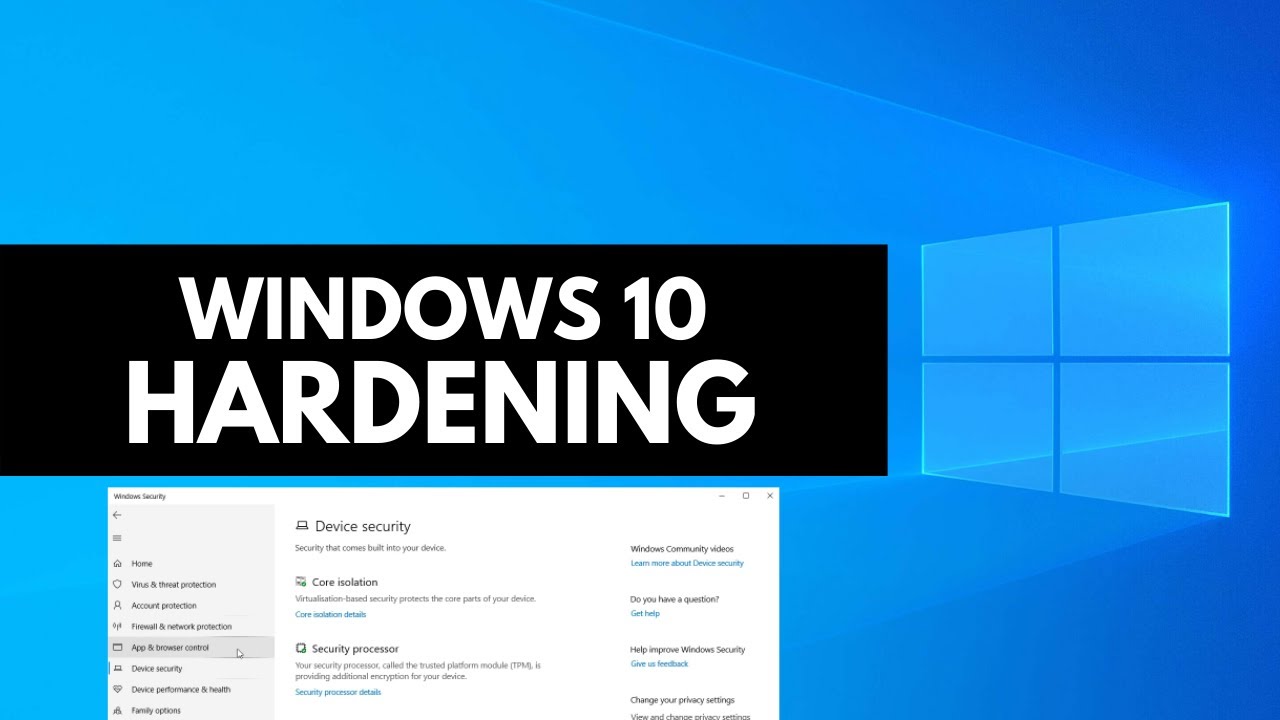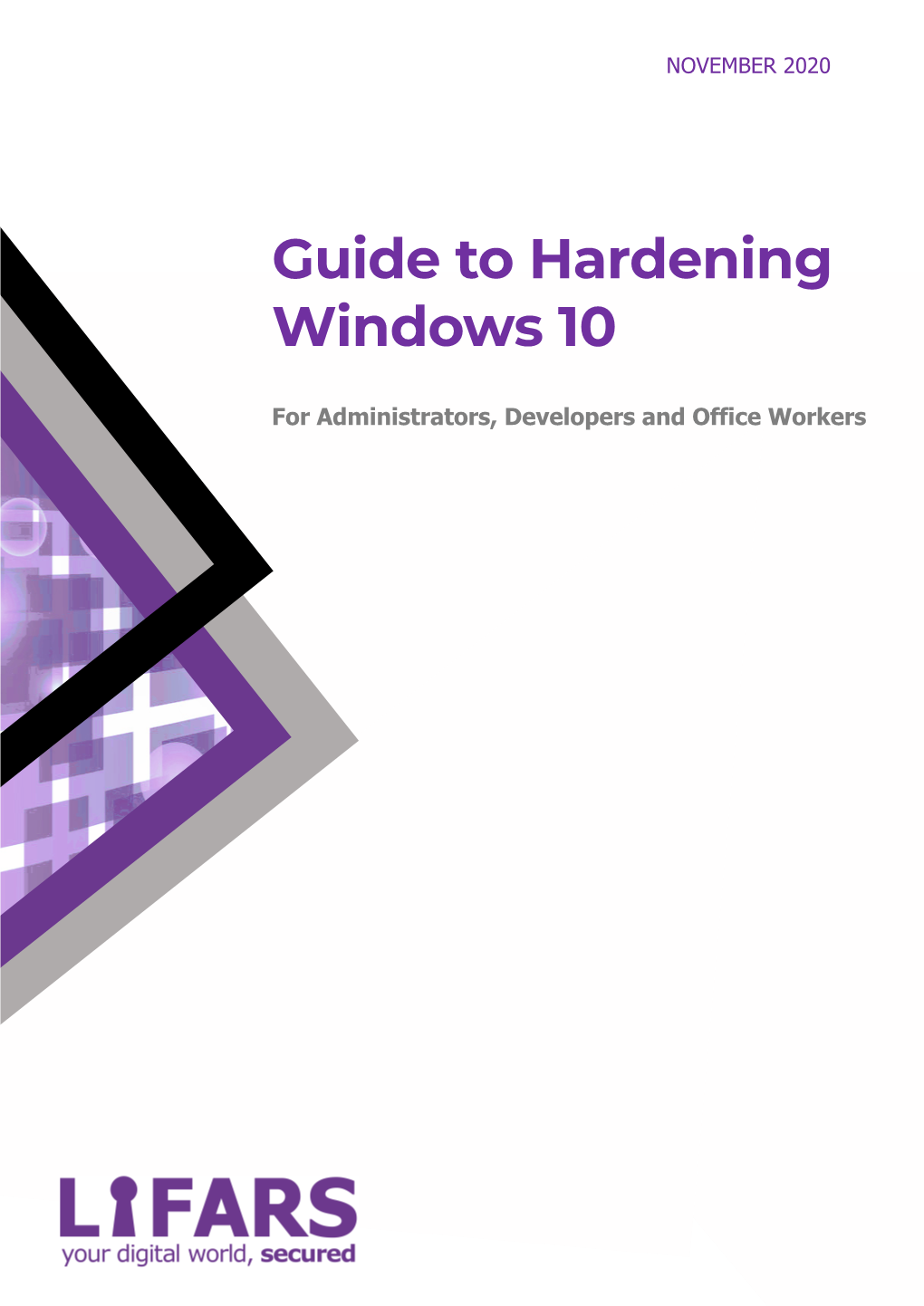ASD Windows 10 Hardening Guide 2025: A Comprehensive Insight
ASD Windows 10 Hardening Guide 2025: A Comprehensive Insight
Related Articles: ASD Windows 10 Hardening Guide 2025: A Comprehensive Insight
Introduction
With great pleasure, we will explore the intriguing topic related to ASD Windows 10 Hardening Guide 2025: A Comprehensive Insight. Let’s weave interesting information and offer fresh perspectives to the readers.
Table of Content
- 1 Related Articles: ASD Windows 10 Hardening Guide 2025: A Comprehensive Insight
- 2 Introduction
- 3 ASD Windows 10 Hardening Guide 2025: A Comprehensive Insight
- 3.1 Introduction
- 3.2 Key Principles of Hardening
- 3.3 Key Hardening Measures
- 3.4 Importance of Hardening
- 3.5 FAQs
- 3.6 Tips
- 3.7 Conclusion
- 4 Closure
ASD Windows 10 Hardening Guide 2025: A Comprehensive Insight

Introduction
In the ever-evolving cybersecurity landscape, safeguarding systems against malicious threats is paramount. The ASD Windows 10 Hardening Guide 2025 serves as an invaluable resource for organizations seeking to enhance the security posture of their Windows 10 environments. This guide outlines a comprehensive set of measures designed to mitigate vulnerabilities, prevent unauthorized access, and protect sensitive data.
Key Principles of Hardening
The ASD Windows 10 Hardening Guide 2025 is grounded in several fundamental principles:
- Principle of Least Privilege: Restricting user permissions to the minimum necessary for their roles and responsibilities.
- Defense in Depth: Implementing multiple layers of security controls to create a more resilient environment.
- Network Segmentation: Dividing the network into smaller, isolated segments to limit the spread of attacks.
- Regular Updates: Applying security patches and updates promptly to address known vulnerabilities.
- Continuous Monitoring: Actively monitoring systems for suspicious activity and potential threats.
Key Hardening Measures
The guide encompasses a wide range of hardening measures, including:
- Secure Boot: Verifying the integrity of the boot process to prevent unauthorized software from loading.
- Trusted Platform Module (TPM): Storing cryptographic keys securely to enhance system integrity.
- Windows Defender: Configuring and managing Microsoft’s built-in antivirus software to protect against malware.
- Firewall: Restricting network access to authorized users and services.
- User Account Control (UAC): Elevating user privileges only when necessary to reduce the impact of malicious activity.
- Application Whitelisting: Limiting the execution of only authorized applications to prevent unauthorized code from running.
- System Logging: Enabling detailed logging to facilitate incident detection and response.
- Security Baseline: Establishing a standardized configuration for all Windows 10 systems to ensure consistency and reduce vulnerabilities.
Importance of Hardening
Implementing the measures outlined in the ASD Windows 10 Hardening Guide 2025 offers significant benefits, including:
- Reduced Risk of Breaches: Hardening reduces the likelihood of successful cyberattacks by eliminating or mitigating vulnerabilities.
- Improved Compliance: Adherence to the guide helps organizations meet regulatory and industry compliance requirements.
- Enhanced Data Protection: By restricting access and implementing security controls, organizations can better protect sensitive data from unauthorized disclosure or theft.
- Increased System Reliability: Hardening measures can improve system stability and performance by reducing the impact of malware and other threats.
FAQs
Q: Is the ASD Windows 10 Hardening Guide 2025 applicable to all Windows 10 versions?
A: Yes, the guide is applicable to all supported versions of Windows 10.
Q: How often should the hardening measures be reviewed and updated?
A: The guide recommends reviewing and updating hardening measures regularly, especially after security patches or updates are applied.
Q: What are the potential consequences of not implementing the hardening measures?
A: Failure to implement hardening measures can increase the risk of successful cyberattacks, data breaches, and system compromise.
Tips
- Use a centralized management tool: Manage hardening settings across multiple systems efficiently.
- Automate updates and patching: Ensure systems are always up to date with the latest security patches.
- Monitor security logs regularly: Review logs for suspicious activity and potential threats.
- Engage with security experts: Seek professional guidance to enhance your hardening strategy and address specific security concerns.
Conclusion
The ASD Windows 10 Hardening Guide 2025 provides a comprehensive roadmap for organizations seeking to enhance the security posture of their Windows 10 environments. By implementing the measures outlined in the guide, organizations can significantly reduce their risk of cyberattacks, protect sensitive data, and ensure the reliability of their systems. It is crucial to prioritize hardening efforts and maintain a vigilant approach to cybersecurity to safeguard critical assets and mitigate evolving threats.







Closure
Thus, we hope this article has provided valuable insights into ASD Windows 10 Hardening Guide 2025: A Comprehensive Insight. We thank you for taking the time to read this article. See you in our next article!